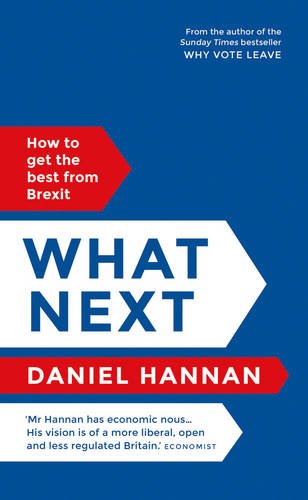 If you are filled with pessimism by current affairs, and Brexit contributes to your anxieties, allow me to recommend a prescription to you. Daniel Hannan’s “What Next, How to get the best from Brexit” is an astonishingly good soother of the nerves.
If you are filled with pessimism by current affairs, and Brexit contributes to your anxieties, allow me to recommend a prescription to you. Daniel Hannan’s “What Next, How to get the best from Brexit” is an astonishingly good soother of the nerves.
Considered one of the masterminds behind Brexit, Hannan put forward the intellectual case for Leave. His book last year, “Why Vote Leave?” quickly became a Sunday Times bestseller, swaying opinions across the country. In his next book, with a clear vision and ladles of optimism he provides a much-needed target for the future of the relationship between the UK and the EU.
Hannan begins triumphally, lauding the efforts of the millions who made Brexit a reality – something for which he has campaigned most of his life – and tells the story of precisely what was happening behind the scenes during the campaign. This makes for reading that is rather fascinating. In roughly 50 pages, Hannan reveals goings on that may come across to some readers as quite shocking. Particularly noteworthy is the way he rubbishes Nigel Farage and Arron Banks, in such a way that you feel you are becoming privy to little known gems of political truth. Hannan convincingly concludes that the duo was actually less interested in winning the referendum, and more interested in “using the referendum as a vehicle to promote UKIP in general and Nigel in particular.”
After the juicy gossip of the politics behind Brexit is dealt with, Hannan moves onto dealing with the European Trade area and the technicalities surrounding it. Discussion of the relationships between states and the EU are chock full of jargon, but Hannan deals with what has come to be a somewhat impenetrable subject quite nicely. He first distinguishes between a free trade area and a customs union (giving examples along the way) and explains why we want to be a member of the former and not the latter.
As I read on, I thought that the book may as well be titled “Brexit for Dummies,” as its treatment of the issues at hand are so straightforward and sensible. But I think that may do the book a slight disservice, as it by no means treats its reader as a dummy. Hannan has enormous amounts of reverence for the reader, articulated in his characteristically eloquent style in a chapter named “Populism Versus Democracy.” For those uninitiated to Hannan, it may come as a surprise that he mentions immigration very little. He cares most about sovereignty and deregulation, not only highlighting their importance in an increasingly globalised world, but also showing ways that Britain can achieve its goals in these areas.
All the time Hannan reminds us that Brexit is not an event, but rather, a process. He also reminds us that because the UK is totally unique in its position in Europe, it should not simply seek to emulate Iceland or Switzerland, but rather get its own unique arrangement that is both as free market as possible as well as outside the political union.
On the single market, Hannan emphasises that membership is not as simple as a binary choice – something you don’t hear often. Hannan describes it as more like an amalgam of lots of different things: some very attractive, that work to the benefit of the consumer and bring down prices, and some not so good, like the common external tariff.
This might be worrying to some. A criticism that can be made of Hannan’s optimism, is that he treats post-Brexit arrangements like a cinema pick and mix, without the thought that Eurocrats may not be as sweet to the UK as he might like. But he maintains (and reasonably) that because in diplomacy decisions are made present in mutual interest, rather than grudges, an outcome will be achieved that is mutually beneficial. After all, no one wants to be poorer.
Hannan’s book is easy and fun to read, and gives the reader a realistic plan as we move forward that will benefit, not only the UK, but Europe also.
This review was originally published by the Adam Smith Institute and is reprinted with permission.
(Photo credit: Gage Skidmore. This photo has been cropped and slightly modified for size. CC BY-SA 2.0.)



